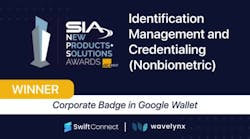Imprivata, a converged authentication and access management company, announced that it has been awarded two new patents by the United States Patent and Trademark Office. The patents, Patent US 7,356,705 and Patent US 7,398,549, cover advances in biometric authentication.
The patents, according to the company, lead by the company's co-founder and Chief Technology Officer (CTO) David Ting, are the latest example of Imprivata's use of technology to provide its customers with the strongest authentication and access management solutions on the market. With the addition of these two, David Ting now owns eight patents. Imprivata has ten other patent pending applications currently dealing with technologies for fingerprint identification, single sign-on, application auditing and physical/logical convergence.
"Here at Imprivata, we are dedicated to innovation-it is a part of our culture-and our people are always looking for new ways to provide customers with the strongest and most robust authentication and access management technologies possible," said David Ting, Co-Founder and CTO, Imprivata. "Having our ideas and inventions accepted as US patents is not only a great honor, but is a strong validation of our products-and our approach." Patent US 7,356,705, entitled "Biometric Authentication for Remote Initiation of Actions and Services," covers a security model that involves establishing trust for client side functionality only as a consequence of first establishing the user identity-in this case, as a result of biometric authentication.
The second patent awarded, Patent US 7,398,549, is entitled "Biometric Authentication with Security Against Eavesdropping." This patent describes a model for biometric authentication designed for mobile biometric solutions, where the biometric templates are stored within a token such as a smart card, enabling a user to be validated without having to disclose the original reference template.

